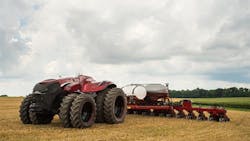Autonomous Vehicles Enter Agriculture Market with Debut of Robot Tractor
As Detroit car makers and Silicon Valley tech giants vie to bring driverless cars to U.S. roads, one of the world’s largest tractor makers is looking to do the same down on the farm.
Case IH, the agricultural-machinery unit of CNH Industrial NV, this week unveiled a sleek, aggressive-looking red-and-black machine at the annual Farm Progress Show in Boone, Iowa.
This tractor -- CNH calls it the Autonomous Concept Vehicle -- has one obvious difference compared with more conventional models: there’s no cab for a driver. Instead, it comes equipped with cameras, radar and GPS, allowing a farmer to remotely monitor planting and harvesting via an app on a tablet computer, the company’s Brand President Andreas Klauser said in an interview Wednesday as crowds gathered around the machine to snap photographs.
Agricultural-machinery companies like Case, Deere & Co. and AGCO Corp. are keen to add the latest technology amid growing interest in the use of big data analysis, drones and satellite imaging. But this brave new world isn’t without its challenges. The U.S. Justice Department said August 31 that it’s suing Deere to stop the company buying a business that it argues would eliminate competition in high-speed planting, a young and developing segment of farming.
While offering efficiencies, technological advances promise to reduce a farmer’s traditional reliance on gut instinct. Some have expressed anxiety about corporations holding onto data gathered from their fields. London-based CNH would face headwinds in getting row-crop farmers to adopt its new technology, but it could gain a foothold in horticulture, Ann Duignan, an analyst at JPMorgan Chase & Co. in New York, wrote in an Aug. 30 report.
Dealing with the legal implications of self-driving tractors is one reason why it could take three years before they’re commercially available, Klauser said. An example he gave is how a farmer would go about moving the tractor from one field to another that may be across a road, since no one is physically driving it.
He declined to disclose how much it has cost to build the tractor on display in Iowa, or how much such a machine might sell for, if it ever moves beyond the concept stage. Case will analyze farmer feedback on its prototype.
The 419-horsepower machine has a maximum speed of 31 miles per hour (50kph), according to Case. That’s much bigger in scale and power than other autonomous concepts, said Sara Olson, a Boston-based analyst at Lux Research who studies farm technology.
“You’re not doing it just to be a novelty,” Klauser said. “You’re doing it to increase the efficiency for your customers.”
By Mario Parker
About the Author
Bloomberg
Licensed content from Bloomberg, copyright 2016.
